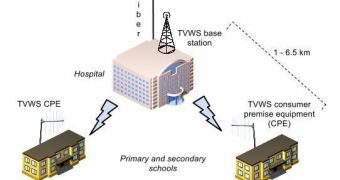Google has been interested in White Space WiFi technology for years and has been pushing towards opening up the airwaves to any network. Now, it's experimenting with a White Space network in South Africa where it's setting up a wireless network between several schools.
"Today we’re announcing the launch of a trial with ten schools in the Cape Town area, which will receive wireless broadband over a white space network," Google explained.
"The service will be broadcast from three base stations located at Stellenbosch University’s Faculty of Medicine and Health Sciences in Tygerberg, Cape Town. Ten schools in the Cape Town area will receive wireless broadband to test the technology," it said.
"During the trial, we will attempt to show that broadband can be offered over white spaces without interfering with licensed spectrum holders," it added.
At the same time, a third-party will periodically check whether the network interferes with existing uses of the spectrum.
What is called White Space spectrum is made up of several radio channels, i.e. pieces of the spectrum, which were used by analog TV broadcasts in much of the world.
But TV broadcasts are going digital which can pack a lot more data in a smaller piece of the spectrum. This leaves several channels free.
The advantage is that the TV spectrum is in the lower frequencies than regular mobile phone or wireless networks.
A lower frequency means signal can travel much greater distances, over rough terrain, with far less energy than is required by WiFi or mobile networks.
In turn, it means that wireless broadband networks can be set up cheaply and efficiently. This is what Google is experimenting with, though it's hardly the only one.
White Space networks have the potential to bring broadband internet to areas where it would be otherwise prohibitively expensive to do so.
Many rural areas in the developing world, but even in the developed world, don't have access to a quality internet connection or any internet connection in many cases because landlines or regular wireless networks are too expensive to justify the investment.

 14 DAY TRIAL //
14 DAY TRIAL //